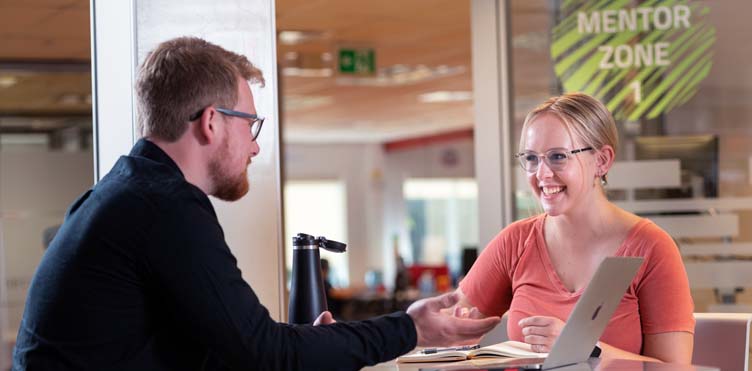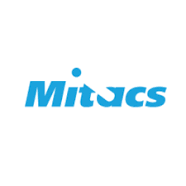Partners and employers

Partnering with UNB to offer experiential education programs and hire UNB students offers a number of benefits:
- Increase diversity, energy and enthusiasm in the workplace
- Provide fresh perspective in non-profit or employer workplaces
- Attract and employ motivated new workers or volunteers
- Retain students post-graduation in New Brunswick and Canada
Types of experiential learning opportunities
Learn more about the ways you can engage with a UNB student or class:
Applied research
Applied research opportunities involve research conducted by a student with guidance from faculty in an academic, industry or community setting. Research may be conducted independently or as a course project.
Course-based experiential learning allows students to apply their learning to real world problems and situations. Since 2018, over 9,000 UNB students have participated in course-based experiential learning opportunities.
Success stories:
- Mackenzie Smith was a part of a group of students in The Nature of History (HIST5901), taught by Dr. Cindy Brown, who completed an oral history project gathering testimony looking into the challenges and impacts of the COVID-19 pandemic.
- Aya Benotmane, an engineering student working through Pathways to Professions, completed an examination of tourism expansion in New Brunswick as part of the BoostNB initiative to measure whether the province is on its way to reaching its economic goals.
Available through:
- Faculty of Arts (Fredericton)
- Faculty of Arts (Saint John)
- Faculty of Business (Saint John)
- Faculty of Computer Science (Fredericton)
- Faculty of Education (Fredericton)
- Faculty of Engineering (Fredericton)
- Faculty of Forestry & Environmental Management (Fredericton)
- Faculty of Kinesiology (Fredericton)
- Faculty of Management (Fredericton)
- Faculty of Nursing (Fredericton)
- Faculty of Science (Fredericton)
- Faculty of Science (Saint John)
- Faculty of Science, Applied Science, & Engineering (Saint John)
- Renaissance College (Fredericton)
Community engaged learning
Success stories:
- As part of the EngagedUNB Summer Internship Program, Jacqueline Nsubuga completed an internship with UNB Sustainability as a Sustainability Engagement & Education Intern, where she collaborated with students, faculty and staff to promote and foster sustainable communities at UNB.
- Alexis Grant, a business administration student, worked with the New Brunswick Association for Community Living to provide strategic insights to strengthen their revenue generating program.
Available through:
- Faculty of Arts (Fredericton)
- Faculty of Arts (Saint John)
- Faculty of Business (Saint John)
- Faculty of Education (Fredericton
- Faculty of Engineering (Fredericton)
- Faculty of Forestry & Environmental Management (Fredericton)
- Faculty of Kinesiology (Fredericton)
- Faculty of Law (Fredericton)
- Faculty of Management (Fredericton)
- Faculty of Nursing (Fredericton)
- Faculty of Recreation and Sport Studies (Fredericton)
- Faculty of Science, Applied Science, & Engineering (Saint John)
- Promise Partnership (Saint John)
- Renaissance College (Fredericton)
Co-operative education
Co-op placements are paid workplace experiences in a setting related to a student’s field of study and are typically undertaken in alternating work terms and study terms.
Since 2018, over 2,100 UNB students have completed co-op placements. Co-operative education gives students the opportunity to apply their academic skills in a short-term partnership with a business or organization.
Success stories:
- Gabriel Ibarra worked with Sankara, a new business selling international food through local vendors and built them a mobile app to help connect them to new customers during his Computer Science co-op work term.
- Kyle Benson completed three co-op terms as a Business Support intern with Future Link NB and the Chamber of Commerce, partnering with various local businesses to develop project plans in areas that will benefit businesses the most.
Available through:
- Faculty of Arts (Saint John)
- Faculty of Business (Saint John)
- Faculty of Computer Science (Fredericton)
- Faculty of Computer Science (Saint John)
- Faculty of Engineering (Fredericton)
- Faculty of Management (Fredericton)
- Faculty of Science (Fredericton)
Internships
Since 2018, over 437 UNB students have completed internships. Internships give students the opportunity to apply their academic skills in a short-term partnership with a business or organization.
Success stories:
- Aishwarya Yewle completed an internship for her MBA program at 3DPlaneta, where her focus was on marketing for 2metre, an initiative helping businesses address COVID-19 restriction and their accompanying challenges.
- Sarah Lunney completed an Arts internship with the Saint John Community Food Basket by advocating to local and federal government, connecting with other local agencies, and proposing new projects to aid in tackling food insecurity.
Available through:
- EngagedUNB Summer Internship Program
- Faculty of Arts (Fredericton)
- Faculty of Arts (Saint John)
- Faculty of Business (Saint John)
- Faculty of Computer Science (Fredericton)
- Faculty of Computer Science (Saint John)
- Faculty of Education (Fredericton)
- Faculty of Forestry & Environmental Management (Fredericton)
- Faculty of Kinesiology (Fredericton)
- Faculty of Law (Fredericton)
- Faculty of Management (Fredericton)
- Faculty of Recreation and Sports Studies (Fredericton)
- Renaissance College (Fredericton)
Practicums and clinical placements
Practicums and clinical placements are work experiences supervised by an experienced registered or licensed professional, required for professional licensure or certification. These placements give students the opportunity to apply their academic skills in a short-term partnership with a business or organization.
Since 2018, over 2,200 UNB students have completed clinical placements through out ExperienceUNB program. These placements help students enter the world of work and prepare for the future.
Success stories:
- Amanda Cherry was part of a group of Saint John Nursing practicum students who hosted Teddy Bear Health Clinics and health education sessions at local elementary schools to put classroom theory into practice and educate students about relevant health subjects.
- Abby Dunlop completed a 16-week education practicum at Island View School in Saint John, where she taught and planned lessons for a first-grade French-immersion class, giving them a solid foundation in the language.
Available through:
- Faculty of Arts (Fredericton)
- Faculty of Arts (Saint John)
- Faculty of Education (Fredericton)
- Faculty of Kinesiology (Fredericton)
- Faculty of Nursing (Fredericton)
- Faculty of Science, Applied Science, & Engineering (Saint John)
Project-based learning
Project-based learning opportunities are activities intended to find solutions to real world problems, culminating in a concrete end-product. Project-based learning is usually embedded within a course and may or may not involve an external partner.
Since 2018, over 9,000 UNB students have participated in course-based and project-based experiential learning opportunities.
Success stories:
- Ingmara Wheeler, a civil engineering student, worked with the New Brunswick Department of Transportation for her team’s senior design project, designing two covered bridges to be built in St. Martin’s while considering economic, social, environmental, and historical constraints.
- Holly Ayles, a student in the Faculty of Management capstone course Strategic Management, worked with her class and Malley Industries, a company manufacturing ambulances, wheelchair accessible vehicles and other mobility-centred products, to complete marketing research and strategize to increase sales possibilities.
Available through:
Project-based learning opportunities are available in all UNB faculties!
Engaging with the Office of Experiential Education
Partner access benefits
- Access funding
- Coordinate federal funding applications
- Confirm and document placements
Partner responsibilities
- Creating a job description for the position they wish to fill, keeping in mind that students have different skills and levels of experience than long-standing members of the work force
- Signing and returning confirmation forms and invoices for your placement
- Completing all required steps to access funding
Supporting your placement
- Receive your student placement information
- Confirm your placement
- Coordinate funding if necessary
- Document all steps throughout the process
Funding for hiring UNB students
The Office of Experiential Education coordinates funding streams. We always recommend that employers attempt to fund 25% of wages, but recognize this is not always possible.
Employment timeline
2-4 months before employment term
The academic office/supervisor organizes the placement between the employer and student and the Office of Experiential Education assists in figuring out the best funding options available.
6 weeks prior to the start of the employment term
The Office of Experiential Education will request information on the placements and will send the employer and the student a placement letter to confirm the details of your placement (start/end date, hrs/week, wage/hr, employer contributions, funding partner expectations, contacts at UNB).
At this point the Office of Experiential Education will request an invoice from the employer to pay 100% of the non-employer funded portion upfront. For most positions, the employer and student will also be asked to complete a portion of the relevant funding application. This information will be conveyed with the placement confirmation letter. The Office of Experiential Education can assist employers/students who need help with this.
4-8 weeks after the end of the employment term
If there is a federal SWPP subsidy involved, the Office of Experiential Education will request reimbursement once employer receives this subsidy.
Funding sources
The Office of Experiential Education provides access to a number of provincial and federal funding programs that support experiential learning.
Future NB SELF

Future NB SELF (Student Experiential Learning Fund) provides wage subsidies for experiential learning placements (internships, work experiences). Funding is provided to off-campus employers to hire students through experiential learning programs. Undergraduate students only.
Future NB SSF

Future NB SSF (Student Support Fund) provides funds to offset student costs associated with experiential learning opportunities (including course-based opportunities). Can be used for travel, moving expenses, accommodations, equipment, supplies, etc. Undergraduate students only.
Future NB Co-op

Future NB Co-op provides wage subsidies specifically for co-op placements. Funding is managed through co-op offices and provided to on- and off-campus employers to hire undergraduate or graduate co-op students for co-op work terms.
Future NB International

Future NB International provides funding for international students in experiential learning opportunities. Graduate and undergraduate students, working on- and off-campus are eligible.
Future Wabanaki

Future Wabanaki provides funding for Indigenous students to access culturally relevant experiential learning opportunities. Can be used for placement-based or project-based opportunities. Managed by Kate Copage, Indigenous Experiential Learning Coordinator.
Student Work Placement Program (SWPP)
- Provides up to 75% (max. $7500) wage subsidies to employers
- On- and off-campus employers can apply
- Different funding partners in different employment/labour market sectors
- Only available to Canadian citizens & permanent residents
- Applications facilitated through experiential learning programs and the Office of Experiential Education
CEWIL iHub

CEWIL is a national community of practice for work-integrated learning offering several funding opportunities. The iHub (Innovation Hub) funding for innovative work-integrated learning (WIL) is available for curricular (course-based) WIL in the following categories: applied research, entrepreneurship, field placements, and service learning . A call for funding is available each semester and funding provides up to $1800 per student enrolled in the course. Goals of this funding include:
- Expanding access to WIL opportunities, particularly for under-represented students
- Removing barriers for students to participate in work-integrated learning
- Leveraging technology to enhance programming or extend access, including the use of technology to support virtual or remote WIL experiences in response to COVID-19
- Innovating work-integrated learning through new partnerships and new models for curricular WIL
Mitacs

Mitacs offers research and innovation funding program supporting industrial and social innovation in Canada via several programs, including the Business Strategy Internship (BSI) program. This program supports students to undertake innovation projects to help businesses and not for profits.
Mitacs provides 50%-75% of funding to support 12-16 week student internships valued at $10,000-$15,000 aimed at helping organizations thrive.
Mitacs offers several additional programs for students and post-doctoral fellows engaged in research or entrepreneurship. For more information on these programs, please contact the UNB Office of Research Services or UNB’s Mitacs representative.
Contact us at experiential@unb.ca to learn more about the funding opportunities available to help you hire a UNB student to work with you.
